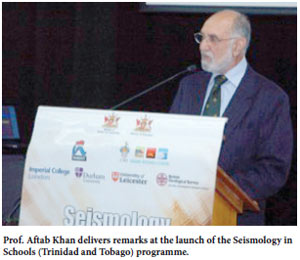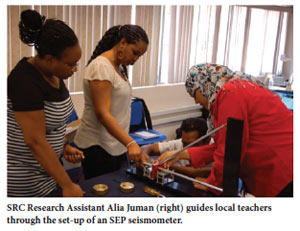|
May 2014

Issue Home >>
|

 On April 7, teachers from eight secondary schools across Trinidad and Tobago gathered at the School of Education, St. Augustine Campus to be trained as part of the launch the Seismology in Schools (SIS) Trinidad and Tobago programme. The SIS initiative, a collaborative effort among partners: NIHERST, UWI-SRC, the Ministry of Education, the British Geological Survey, University of Leicester, Imperial College London and Durham University, seeks to encourage the study of physics and math using seismology as the vehicle. On April 7, teachers from eight secondary schools across Trinidad and Tobago gathered at the School of Education, St. Augustine Campus to be trained as part of the launch the Seismology in Schools (SIS) Trinidad and Tobago programme. The SIS initiative, a collaborative effort among partners: NIHERST, UWI-SRC, the Ministry of Education, the British Geological Survey, University of Leicester, Imperial College London and Durham University, seeks to encourage the study of physics and math using seismology as the vehicle.
 The Seismology in Schools programme grew out of an extra-curricular activity at the University of Leicester, UK that eventually spread across the country and was ultimately adopted by the British Geological Survey. In the UK, the programme now boasts over 500 school physics departments and claims responsibility for a marked increase in the number of students writing physics and math at Advanced Level since the programme’s launch in 2006. Bringing the programme to Trinidad and Tobago was mainly the doing of Emeritus Professor of Geophysics and son of the soil Prof. Aftab Khan, under whose leadership the idea was initially allowed to flourish at the University of Leicester. The Seismology in Schools programme grew out of an extra-curricular activity at the University of Leicester, UK that eventually spread across the country and was ultimately adopted by the British Geological Survey. In the UK, the programme now boasts over 500 school physics departments and claims responsibility for a marked increase in the number of students writing physics and math at Advanced Level since the programme’s launch in 2006. Bringing the programme to Trinidad and Tobago was mainly the doing of Emeritus Professor of Geophysics and son of the soil Prof. Aftab Khan, under whose leadership the idea was initially allowed to flourish at the University of Leicester.
As part of the project, eight pilot schools received Science Enhancement Programme  (SEP) seismometers capable of detecting regional earthquakes and larger events further afield. The Trinidad and Tobago network formed by these initial participants is registered with the BGS and joins a larger network that enables local students to share and compare their data with schools in the UK, and similar school seismology networks around the world. Physics, math and geography teachers were trained in the use of software that allows students to record and locate significant earthquakes detected by their new seismometers. (SEP) seismometers capable of detecting regional earthquakes and larger events further afield. The Trinidad and Tobago network formed by these initial participants is registered with the BGS and joins a larger network that enables local students to share and compare their data with schools in the UK, and similar school seismology networks around the world. Physics, math and geography teachers were trained in the use of software that allows students to record and locate significant earthquakes detected by their new seismometers.
Technical support for this foray into student seismology is provided by UWI-SRC via its Education and Outreach section. As the agency charged with monitoring earthquakes and volcanoes in the eastern Caribbean, the UWI-SRC welcomes this development and hopes that teaching students the rudiments of seismology will not only produce the next crop of Caribbean geoscientists, but also foster greater awareness of the earthquake hazard among youth. Increased awareness is vital if Trinidad and Tobago is to be adequately prepared should God relinquish his long-held Trinidad and Tobago citizenship.
|





 On April 7, teachers from eight secondary schools across Trinidad and Tobago gathered at the School of Education, St. Augustine Campus to be trained as part of the launch the Seismology in Schools (SIS) Trinidad and Tobago programme. The SIS initiative, a collaborative effort among partners: NIHERST, UWI-SRC, the Ministry of Education, the British Geological Survey, University of Leicester, Imperial College London and Durham University, seeks to encourage the study of physics and math using seismology as the vehicle.
On April 7, teachers from eight secondary schools across Trinidad and Tobago gathered at the School of Education, St. Augustine Campus to be trained as part of the launch the Seismology in Schools (SIS) Trinidad and Tobago programme. The SIS initiative, a collaborative effort among partners: NIHERST, UWI-SRC, the Ministry of Education, the British Geological Survey, University of Leicester, Imperial College London and Durham University, seeks to encourage the study of physics and math using seismology as the vehicle. The Seismology in Schools programme grew out of an extra-curricular activity at the University of Leicester, UK that eventually spread across the country and was ultimately adopted by the British Geological Survey. In the UK, the programme now boasts over 500 school physics departments and claims responsibility for a marked increase in the number of students writing physics and math at Advanced Level since the programme’s launch in 2006. Bringing the programme to Trinidad and Tobago was mainly the doing of Emeritus Professor of Geophysics and son of the soil Prof. Aftab Khan, under whose leadership the idea was initially allowed to flourish at the University of Leicester.
The Seismology in Schools programme grew out of an extra-curricular activity at the University of Leicester, UK that eventually spread across the country and was ultimately adopted by the British Geological Survey. In the UK, the programme now boasts over 500 school physics departments and claims responsibility for a marked increase in the number of students writing physics and math at Advanced Level since the programme’s launch in 2006. Bringing the programme to Trinidad and Tobago was mainly the doing of Emeritus Professor of Geophysics and son of the soil Prof. Aftab Khan, under whose leadership the idea was initially allowed to flourish at the University of Leicester. (SEP) seismometers capable of detecting regional earthquakes and larger events further afield. The Trinidad and Tobago network formed by these initial participants is registered with the BGS and joins a larger network that enables local students to share and compare their data with schools in the UK, and similar school seismology networks around the world. Physics, math and geography teachers were trained in the use of software that allows students to record and locate significant earthquakes detected by their new seismometers.
(SEP) seismometers capable of detecting regional earthquakes and larger events further afield. The Trinidad and Tobago network formed by these initial participants is registered with the BGS and joins a larger network that enables local students to share and compare their data with schools in the UK, and similar school seismology networks around the world. Physics, math and geography teachers were trained in the use of software that allows students to record and locate significant earthquakes detected by their new seismometers.